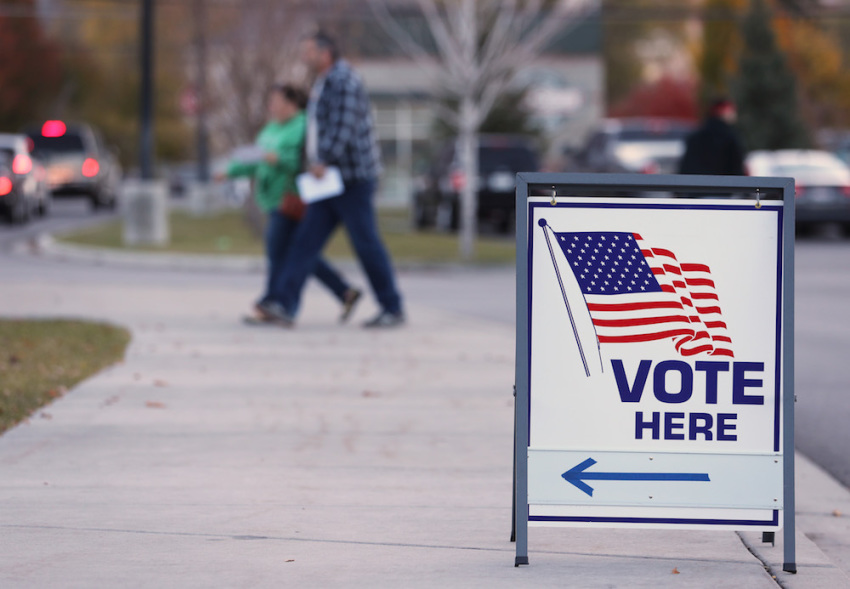Percentage of Christian registered voters drops 15% since 2008: Pew

The share of registered voters in the United States who say they are Christian has declined by about 15% since 2008 while the number of religiously unaffiliated voters has nearly doubled, Pew Research Center data suggests.
Pew drew the data from a balanced survey of over 360,000 registered voters surveyed over a 25-year span that include over 12,000 voters questioned in 2018 and 2019.
The data indicates that 64% of all registered voters surveyed in 2019 self-identified as Christian. That figure is down from 79% of registered voters surveyed in 2008 who identified themselves as followers of Christ.
The study shows that the decline in registered Christian voters is most stark in the Democratic Party.
In 2008, 73% of registered Democrats identified as Christian. But by 2019, only 52% of Democrat voters said the same.
Among Democratic Christians, only the number of Hispanic Catholic voters increased. And that figure only increased by 1 percentage point.
Registered Republican voters have seemingly moved away from God at a slower rate, dropping from 87% Christian in 2008 to 79% Christian in 2019.
In comparison, the number of religiously unaffiliated voters has almost doubled from 15% to 28% in the same years.
“What’s going down is faith among the American people. The percentage of Americans who identify as Christian has been declining,” Galen Carey, National Association of Evangelicals vice president of government relations, told The Christian Post. “The number of Americans of faith is declining. The concern to us is not how many Christians are registered voters but how many voters are Christians.”
Among registered voters, almost all Christian denominations have decreased in number, the data shows. The two exceptions are Hispanic Catholics and non-evangelical Protestants who didn’t provide their race or belong to small racial minorities.
In contrast, the religiously unaffiliated have grown rapidly as a percentage of the vote.
Democrats became unaffiliated at a quicker rate, with religiously unaffiliated going from 18% to 38% in 11 years.
In the Republican Party, religiously unaffiliated numbers increased from 9% to 15% in the same timeframe.
Unaffiliated people are either atheists, agnostics or "nothing in particular,” said Pew researcher Greg Smith.
Although these people may be religiously unaffiliated, they may be politically affiliated, Smith added.
"It's worth noting that being religiously unaffiliated does not necessarily imply anything about the respondent’s politics — that is, it’s not related to being a political independent," Smith explained.
Carey said that Christians often disagree considerably on policy questions.
America doesn’t have a Christian political party, so they are found on both sides of the aisle, he assured. Joe Biden’s presidential campaign faired better at winning Christian voters than Hillary Clinton’s 2016 campaign because the former vice president did a better job of reaching out to Christian Democrats, Carey argues.
“The Democrats have a lower percentage of Christians. But still, most Democrats are Christians,” Carey stated. “If you picked a Democrat at random, it’s more likely he or she is a Christian than not.”
Policy shifts from both parties might reflect this shift from the faith, he said. From 2008 to 2020, Democrats have switched from mostly saying abortion should be legal under some circumstances to saying that it should be legal in all circumstances, Gallup data shows.
Republicans in the same timeframe have remained roughly the same on abortion.
On religious freedom, the Democratic Party’s 2020 platform has also changed, becoming far less positive about the topic than in 2008.
“We honor the central place of faith in our lives. Like our Founders, we believe that our nation, our communities, and our lives are made vastly stronger and richer by faith and the countless acts of justice and mercy it inspires,” reads the 2008 platform.
The 2020 platform doesn’t applaud faith so much as it applauds America’s history of religious freedom. The 2020 platform also specifically opposes certain religious freedom exemptions for faith-based organizations.
“Democrats will protect the rights of each American for the free exercise of his or her own religion,” the 2020 platform reads. “We will reject the Trump Administration’s use of broad religious exemptions to allow businesses, medical providers, social service agencies, and others to discriminate.”
In both 2008 and 2020, the Republican Party platform said that Americans should be able to apply their faith to everyday life without fear of government-imposed hiring practices.
The smallest religious category in the survey, "other faiths," includes Jews, Muslims, Buddhists, Hindus and other faiths, Smith said. In the last decade, the group has risen from 5% to 7% of the population. Members of other faiths vote Democrat at almost twice the rate at which they vote Republican.



























